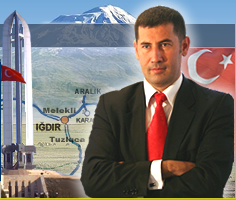Caucasus-watchers are alarmed by the potential for renewed hostilities between Azerbaijan and Armenia over Nagorno-Karabakh. Frustrated at the lack of progress through diplomatic means, Baku is rapidly boosting its arsenal as Yerevan ramps up military cooperation with Russia, raising concerns that armed skirmishes could resume and even spiral into war
Increased frustration with the lack of progress in diplomatic efforts to solve the Nagorno-Karabakh issue is fueling ramped-up military initiatives in Azerbaijan and Armenia, raising concerns about a revival of armed conflict in the Caucasus.
“The conviction that the Nagorno-Karabakh problem cannot be solved through peaceful means is becoming the predominant view in Azerbaijan,” Sinan Oğan, director of the Turkish Center for International Relations and Strategic Analysis, or TÜRKSAM, told the Hürriyet Daily News & Economic Review.
According to recent statements from Baku, Azerbaijan’s military spending has increased more than 13-fold over the past seven years, to $2.15 billion. Armenia is attempting to keep pace with its rival over Nagorno-Karabakh, an Azerbaijani territory under Armenian occupation, by developing military cooperation with Russia.
The “arms race” has the international community worried about the prospect of another war in the region, said Richard Giragosian, the director of the Armenian Center for National and International Studies, or ACNIS. The domestic political context has Baku talking tough, he told the Daily News, quoting Azerbaijani President Ilham Aliyev’s recent statement that “if negotiations are scuttled, a new situation will arise and the issue of solving the problem by military means will be included on the agenda.”
Efforts by the so-called Minsk group, established by the forerunner of the Organization for Security and Cooperation in Europe, or OSCE, to find a diplomatic means of resolving the Nagorno-Karabakh conflict have been unsuccessful and have even delayed a solution, Oğan said. “No one is putting pressure on Armenia to solve the problem. So Baku is telling the world: ‘If you can’t solve it, we will.’”
The possibility that the frozen conflict in the region could break out into armed hostilities was greeted with skepticism, however, by Igor Torbakov from the Finnish Institute of International Affairs.
“Azerbaijan is beefing up its military muscle, but Aliyev cannot fail to understand that any war in the Caucasus would ruin Baku’s energy aspirations,” Torbakov said. “Baku does pump tons of money into its military, but this appears to be a way to ramp up psychological pressure on Yerevan and the international community at large and send a signal that the current status quo is unsustainable.”
A flashpoint of the Caucasus, the region known as Nagorno-Karabakh is a constituent part of Azerbaijan that has been occupied by Armenia since the end of 1994. While internationally recognized as Azerbaijani territory, the enclave has declared itself an independent republic and is administered as a de facto part of Armenia.
The Nagorno-Karabakh War from 1988 to 1994, and the subsequent occupation by Armenia, led to the deaths of more than 30,000 and created nearly 1 million refugees, who largely remain in temporary settlement camps and facilities in Azerbaijan.
Years of negotiations involving Russia, the United States and Europe, as well as Azerbaijani and Armenian leaders themselves, have failed to resolve the enclave’s status or enable the return of refugees. Turkey closed its border with Armenia in 1993 in support of its close ally Azerbaijan in the conflict.
Messages from Moscow
Azerbaijani frustration with the lack of progress on the issue, combined with Baku’s unhappiness and sense of betrayal over Ankara and Yerevan’s moves toward a tentative reconciliation, make the situation dangerous, TÜRKSAM’s Oğan said.
He said Russian President Dmitry Medvedev embarking Thursday on a visit to Armenia is a message to Azerbaijan “not to resort to military measures.” Under a far-reaching deal to be signed during the visit, Moscow will extend its lease on a military base in Armenia by 24 years and upgrade the mission of the estimated 3,000 Russian troops stationed there.
“The rising tension along the ‘line of contact’ separating the Karabakh and Azerbaijani sides has sparked new concerns over the fragility of the cease-fire agreement that first ‘froze’ the Karabakh conflict in May 1994 and has led to fresh worries about the possibility of further clashes or skirmishes,” said Giragosyan, the ACNIS director.
“The danger is not one of all-out war, however, but rather of a danger of ‘war by accident,’” he said, adding that smaller-scale clashes and skirmishes could spiral dangerously out of control.
“Although both sides might want to avoid all-out war, the potential for war, unfortunately, does exist,” Torbakov said. “As each side is prone to brinkmanship and we’re dealing with a bunch of pretty hot-headed leaders, a series of provocations combined with miscalculations might indeed send the shaky equilibrium spinning out of control – as happened in Georgia in 2008.”
Any renewal of hostilities would be short-lived and take place in the seven Azerbaijani regions surrounding Nagorno-Karabakh that are also under Armenian occupation, Oğan said. “The war will not spread to Nagorno-Karabakh, but Azerbaijan might strike to take back some of the surrounding territories.”
Though Giragosian cautioned that such skirmishes could quickly expand to bring in other powers, such as Russia or even Turkey, Oğan expressed doubts that Russia would actually interfere in a small, short-lived armed conflict.
“Russia does not have the right to interfere in the regions surrounding Nagorno-Karabakh,” he said. “It might even use a small-scale conflict to exert pressure on Armenia to solve the issue, since the Russian administration does not want the status quo to continue.”
This article is taken from TURKSAM.
Sinan OĞAN

